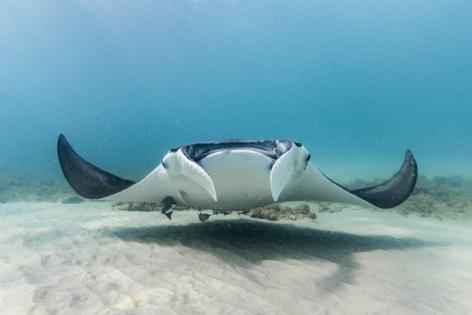3 Florida manta rays captured for SeaWorld Abu Dhabi, 1 died, records show
Published in Science & Technology News
ORLANDO, Fla. — Two years before its controversial videotaped capture of a giant manta ray last month, a Florida company seized two more of the rare creatures for SeaWorld Abu Dhabi, one of which died in captivity, according to new records obtained by the Orlando Sentinel.
The documents shed more light on the video that went viral last month and sparked debate over whether Florida should allow the apprehending of the threatened species from its waters, a practice permitted by no other state.
State wildlife officials confirmed in July the Florida Keys-based aquarium supplier Dynasty Marine Associates had a special license to capture the manta for SeaWorld Abu Dhabi, located about 7,800 miles away from its Florida home.
The video showed a crew pulling the creature from the sea off Panama City Beach and lowering it into a pool on their boat deck.
The company captured two additional manta rays for SeaWorld Abu Dhabi in 2023, but one had to be euthanized after its health declined in a holding tank in the Florida Keys, the newly released records from the Florida Fish and Wildlife Conservation Commission show.
The manta ray died at a Dynasty Marine facility before it could be shipped overseas, according to an email sent to state wildlife officials by Frank Young, Dynasty’s chief operating officer. The other manta ray was successfully sent to the marine park, along with 12 smaller lesser devil rays, Young’s email said.
The manta ray that was euthanized was an immature, moribund male, and it wasn’t immediately clear why its health declined, according to an Oct. 4, 2023, report from Stephen Kajiura, a marine biologist at Florida Atlantic University.
“Overall, the animal appeared to be in good health, and there was no obvious reason for its demise,” he wrote. “I was not able to directly observe the animal prior to my arrival, but was told that it was swimming and feeding normally for several weeks and then experienced a dramatic decline in a short period of time.”
SeaWorld Abu Dhabi, the theme park’s parent company and Dynasty Marine have not responded to requests for comment from the Orlando Sentinel, so the fate of the manta ray captured in July is unclear.
Other overseas aquariums also have sought to capture a manta ray in Florida waters in the past five years, the records show. State wildlife officials have granted licenses to the Nausicaá Centre National de la Mer in France, Chongqing Andover Ocean Park in China and another facility in the United Arab Emirates, The National Aquarium Abu Dhabi.
So far, none of those aquariums have obtained manta rays under the licenses issued over the past five years, wildlife officials said.
The Georgia Aquarium, the only U.S. aquarium to showcase the manta ray, received a license, too, but a spokesman said it has no plans to acquire another manta ray. Its permit was revised this month to remove the manta ray from the list of species the aquarium was seeking.
Opened in May 2023, SeaWorld Abu Dhabi bills itself as the world’s largest indoor marine life theme park. On its website, it promises that it is “committed to providing the highest standard of animal welfare” and is dedicated to marine research, conservation and education.
Nicknamed the “angel of the sea,” the giant manta ray is listed as a threatened species under the Endangered Species Act. It has a wingspan up to 26 feet and can grow to 5,300 pounds, about as much as a car.
Just a handful of aquariums in the world display them, and Florida is the only U.S. state that allows their harvest, according to a 2024 federal report.
The special license allows for the capture of marine life for educational, exhibition and research purposes with the objective of increasing “the public’s knowledge and awareness of Florida’s marine resources.”
But Jessica Pate, founder of the Florida Manta Project, said she thinks manta rays should be left in the wild, given their intelligence and migratory patterns. Manta rays can travel hundreds of miles during seasonal migrations.
“While I think aquariums can be a great way to educate the public, I don’t support taking highly mobile, endangered species from the wild,” she said.
The Georgia Aquarium keeps three manta rays in a massive 6.3 million-gallon habitat, including two that were acquired “ethically and humanely” from Florida about 15 years ago, said Chris Coco, the aquarium’s vice president of aquatic sustainability. The third was an injured, rescued, and rehabilitated manta ray that came to the aquarium in 2010 from South Africa, he said in a statement.
Keeping the manta rays allows research to be conducted that will boost conservation efforts, he added. Scientists, for example, designed and tested multiple types of satellite tags, allowing them to be refined before being deployed in the ocean.
“These manta rays not only serve as ocean ambassadors, providing exceptional public education benefits, but crucially, they also directly contribute to innovative conservation research that is helping protect manta rays in Florida waters,” Coco said.
©2025 Orlando Sentinel. Visit orlandosentinel.com. Distributed by Tribune Content Agency, LLC.







Comments